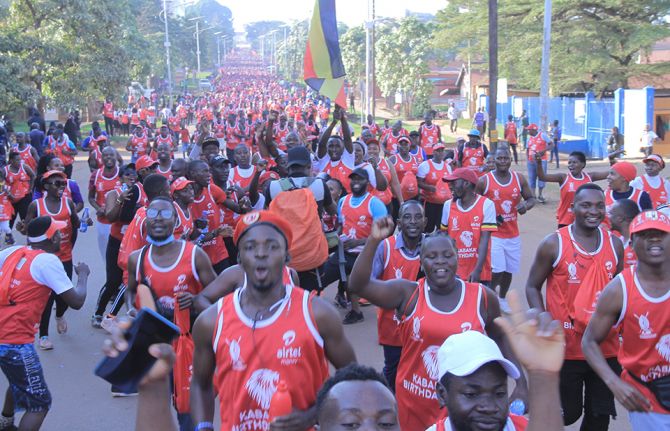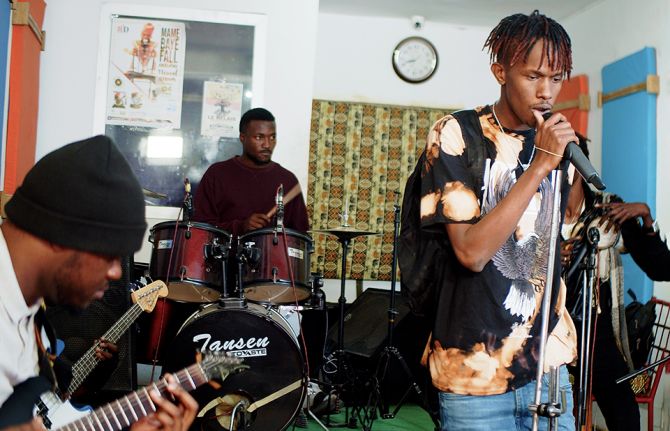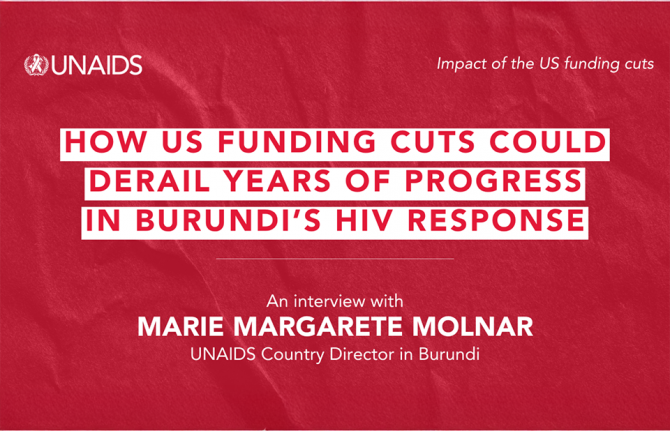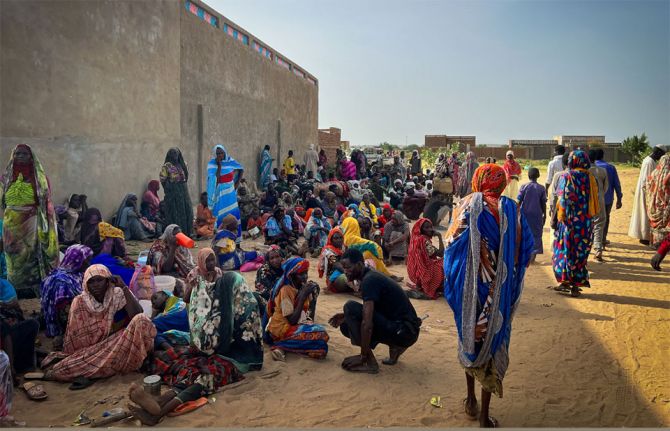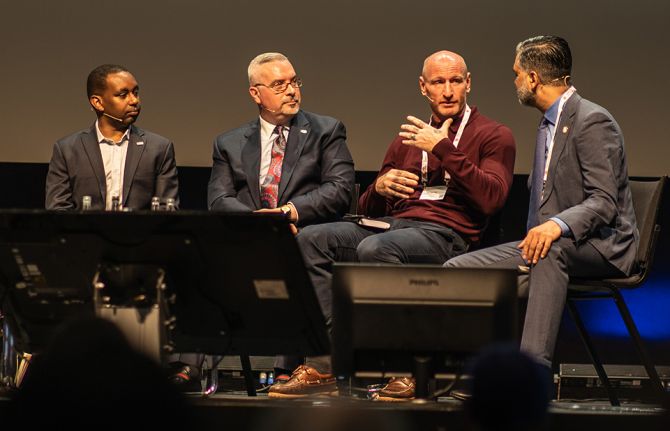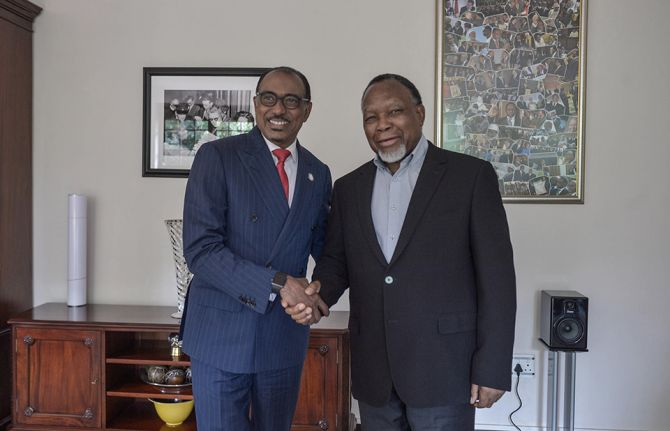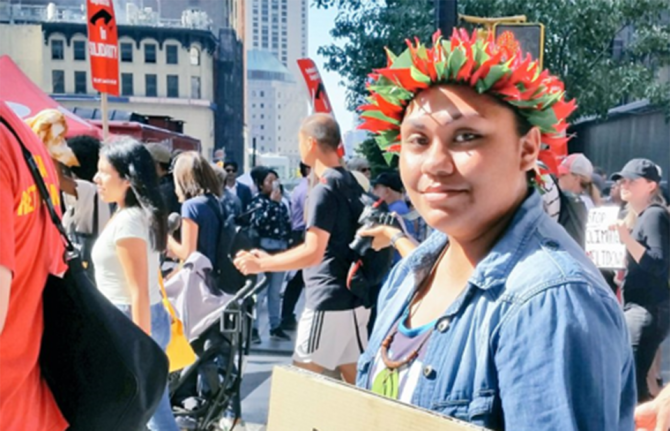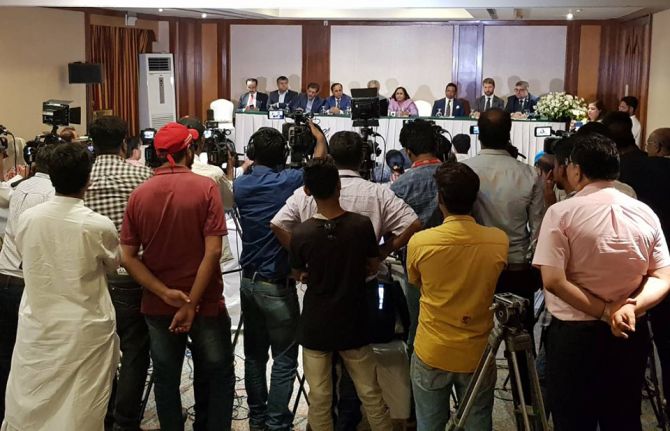
Feature Story
UNAIDS teams up with One Day on Earth to film the HIV response
11 November 2011
11 November 2011 11 November 2011
“One Day on Earth” is a global initiative involving thousands of filmmakers
On 11 November 2011, UNAIDS teamed up with the global initiative, “One Day on Earth” to film the many faces of the HIV response. More than 50 UNAIDS field offices in all parts of the globe participated in the project and captured different HIV-related events taking place during a 24-hour period.
Using small high definition video cameras donated by “One Day on Earth,” field staff filmed a wide range of activities. For example, in sub-Saharan Africa, UNAIDS employees video-taped the flying doctors that bring HIV services to remote communities in the mountains of Lesotho. In Tajikistan, the focus was on a civil society organization called “Spin Plus,” which provides methadone substitution therapy to injecting drug users and in Sri Lanka a UNAIDS staff member living with HIV filmed a program which encouraged hospital staff to overcome stigma and discrimination.
Every minute, in every corner of the world there are health care workers, civil society groups and people living with HIV who are working tirelessly to bring much needed HIV prevention, treatment and care and support to communities
UNAIDS Executive Director Michel Sidibé
“Every minute, in every corner of the world there are health care workers, civil society groups and people living with HIV who are working tirelessly to bring much needed HIV prevention, treatment and care and support to communities,” said UNAIDS Executive Director Michel Sidibé. “We wanted to chronicle their efforts and show that everyday we are coming one step closer to reaching the UNAIDS vision of Zero new HIV infections, Zero discrimination and Zero AIDS-related deaths.”
It is the first time that UNAIDS has participated in the collaborative filming experience which is the brainchild of Kyle Ruddick and Brandon Litman, two entrepreneurs from the United States of America. “Our goal was to film on one day in every country of the world. We wanted to show the amazing diversity, conflict, tragedy and triumph that occur in one day,” said Mr. Litman.
The first annual simultaneous filming event took place last year when thousands of documentary filmmakers, students and citizens in over 190 countries recorded a wide range of events on 10 October 2010. Last year’s footage was made into a feature-length documentary film which will be screened globally next February. In addition all the material is publicly available via an online searchable archive.
External links
External links

Feature Story
Political commitment towards the elimination of new HIV infections among children in Burundi
09 November 2011
09 November 2011 09 November 2011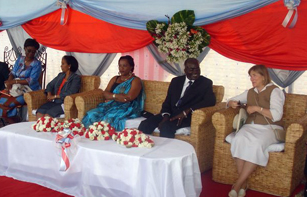
L to R: United Nations Resident Coordinator Rosine Cori Coulibaly, UNAIDS Regional Director for West and Central Africa Meskerem Grunitzky-Bekele, Minister of Health and Fight against HIV/AIDS, Dr Sabine Ntakarutimana, 2nd Vice President of Burundi Gervais Rufyikiri, US Ambassador to Burundi, Pamela Slutz.
Burundi is a small densely populated country located in sub-Saharan Africa with an HIV prevalence of 2.97% among the general population. It is also one of 22 countries worldwide that has contributed to the development of and signed up to implement the Global Plan towards the elimination of new HIV infections among children by 2015 and keeping their mothers alive.
In an effort to inform and mobilize the general population about the possibility of a new Burundian generation free of HIV, the Government of Burundi spearheaded a national launch of the Global Plan at the end of October.
Classified as a low-income country, Burundi’s economy has been highly affected by a long period of civil war, which has had a significant impact on sanitation, infrastructure and human development. In this context, preventing new HIV infections among children has been one of the country’s main challenges, with coverage of HIV services reaching only 30% of pregnant women at the end of 2010. To effectively respond to this challenge, Burundi has developed a national plan for the period of 2011-2015 in accordance with the Global initiative.
Every man should accompany his wife to pre-natal consultation and jointly with her, request an HIV test
His Excellency the 2nd Vice President of Burundi Gervais Rufyikiri
“Every man should accompany his wife to pre-natal consultation and—jointly with her—request an HIV test,” stated His Excellency the 2nd Vice President Gervais Rufyikiri during the launch. “Engagement of men is key to the success of this initiative,” he added.
The U.S. Ambassador to Burundi, Pamela Slutz, emphasized that in order to help the Burundian government eliminate new HIV infections among children, the U.S. Government, through the President’s Emergency Plan for AIDS Relief (PEPFAR), had dedicated US$ 10 million exclusively for the implementation of such programmes in the country.
Speaking at the launch, the Minister of Health and Fight against HIV/AIDS, Dr Sabine Ntakarutimana said that activities like family planning reproductive health and HIV will be harmonized and articulated in the health system to promote efficient results.
UNAIDS Regional Director for West and Central Africa, Dr Meskerem Grunitzky-Bekele, who represented the UNAIDS Executive Director at the launch, highlighted that Burundi understood the need to act now. “The price to be paid for the country’s inaction will be too high for future generations,” she said.
This Global Plan provides the foundation for country-led movement towards the elimination of new HIV infections among children and keeping their mothers alive. The Global Plan was developed through a consultative process by a high level Global Task Team convened by UNAIDS and co-chaired by UNAIDS Executive Director Michel Sidibé and United States Global AIDS Coordinator Ambassador Eric Goosby. It brings together 30 countries and 50 civil society, private sector, networks of people living with HIV and international organizations to chart a roadmap towards achieving this goal by 2015.
Related

Press Statement
UNAIDS welcomes continued leadership and commitment of the United States to the AIDS response
08 November 2011 08 November 2011WASHINGTON D.C./GENEVA, 8 November 2011—The Joint United Nations Programme on HIV/AIDS (UNAIDS) commends the United States Government on its continued leadership in the AIDS response following the call by the US Secretary of State Hillary Rodham Clinton for global solidarity to “change the course of the epidemic and usher in an AIDS-free generation”.
“Leadership from the United States has been vital to the AIDS response to date and will be key to seizing this historic opportunity,” said Michel Sidibé, Executive Director of UNAIDS. “Secretary Clinton has reaffirmed the United States’ Government’s strong commitment to this effort and has described a vision that should inspire us all. I hope that her call will galvanize leadership from around the globe to accelerate efforts to end the AIDS epidemic.”
In her speech, the US Secretary of State outlined the far-reaching impact of scaling up scientifically proven prevention strategies in combination with new and emerging developments in HIV science and research. These strategies include: elimination of new HIV infections among children, increased voluntary medical male circumcision, and expanded access to treatment.
Earlier this year UNAIDS highlighted the significance of the recent research demonstrating that people who access treatment early can reduce their likelihood of transmitting HIV to a partner by 96%. The potential impact of treatment for prevention will change attitudes, connect communities and motivate millions of people find out their HIV status and to talk openly with their partners about HIV.
To achieve an AIDS-free generation, the US Secretary of State reiterated UNAIDS’ call for greater engagement and investment in the global AIDS response by both donor and recipient countries.
UNAIDS underlines the importance of shared responsibility in the AIDS response. Shared responsibility is one of the central pillars of UNAIDS’ strategy to reach zero new HIV infections, zero discrimination and zero AIDS-related deaths by 2015.
UNAIDS is already working closely with PEPFAR and other partners around the world to achieve the ambitious goals UN member states committed to in the 2011 Political Declaration on HIV/AIDS. Achieving these goals will bring the world one step closer to an AIDS-free generation.
Press centre
Download the printable version (PDF)

Feature Story
Ukraine gives AIDS the Red Card
07 November 2011
07 November 2011 07 November 2011
(L to R) Natalya Lukyanova, Red Card Campaign Coordinator, Andriy Shevchenko, Ukrainian National Team football player, Dr Ani Shakarishvili, UNAIDS Country Coordinator in Ukraine
Credit: UNAIDS/K.Gladka
The ‘Give AIDS the red card’ campaign, an initiative that uses the power of football to eliminate stigma and discrimination against people living with HIV, kicked off on Thursday 27 October in Ukraine. Organized by the Government of Ukraine, the new campaign was launched within the framework of the European Football Championship 2012 to be co-hosted by Ukraine and Poland in summer 2012.
“To reach out to young people, we speak ‘football language’ because football unites us regardless of our social, gender, ethnic or religious differences”, said Ravil Safiullin, Head of the State Service for Youth and Sports of Ukraine.
The new campaign also aims to promote safe sex and condom use along with addressing gender inequality, sexual exploitation, and domestic violence. To that end, images of celebrities with the campaign messages will be place on billboards and on metro stations around Kiev and the other country regions. Posters will also be distributed in educational institutions as well as railway stations. Finally, public service announcements will be broadcasted via national media.
The Red Card campaign starts simultaneously in all regions of the country and is supported by the football star Andriy Shevchenko and other celebrities such as singers Ani Lorak and Gaitana and the World’s Strongman 2004 Vasyl’ Virastyuk. UNAIDS, UNICEF and UNFPA as well as civil society organizations such as the All-Ukrainian Network of People Living with HIV, the International HIV/AIDS Alliance in Ukraine and La Strada are also supporting the campaign.
We hope that the campaign will help remove existing barriers to an effective national AIDS response and it will bring Ukraine closer to the UNAIDS vision of Zero new HIV infections, Zero AIDS-related deaths and Zero discrimination
UNAIDS Country Coordinator in Ukraine, Dr Ani Shakarishvili
“This initiative emphasizes the growing commitment of the Government of Ukraine and the society at large to tackle key social problems facing the country,” said Dr Ani Shakarishvili, UNAIDS Country Coordinator in Ukraine. “We hope that the campaign will help remove existing barriers to an effective national AIDS response and it will bring Ukraine closer to the UNAIDS vision of Zero new HIV infections, Zero AIDS-related deaths and Zero discrimination”.
The HIV epidemic continues to grow in Ukraine and it has become the most severe of whole of Europe. Only one third of the estimated 350 000 people currently living with HIV is aware of their status and has access to HIV services. Furthermore, only 26 000 people living with HIV are currently on treatment. According to the Stigma Index research conducted in 2010, more than half of Ukrainians living with HIV are victims of some sort of stigma and discrimination.
Related

Feature Story
Placing families at the heart of the AIDS response in the Middle East and North Africa
04 November 2011
04 November 2011 04 November 2011
Participants at the Qatar Symposium. Doha, Qatar. 02 November 2011
Families need to be empowered to provide the first line of protection against stigma, raise HIV awareness and decrease new HIV infections in the Middle East and North Africa (MENA) countries according to the participants of the recently concluded Qatar Symposium.
The event, which took place 1 – 2 November 2011 in Doha, was organized by the Doha International Institute for Family Studies and development (DIIFSD), UNAIDS and UNICEF to examine the linkages between family, Millennium Development Goals and AIDS in the Middle East.
“We need to address the AIDS epidemic with responsibility and courage,” said Dr Sima Bahous, Assisstant Secretary General of the League of Arab States. “HIV hinders the social, economical and developmental progress of the region and has a negative impact on the health of the family.”
The Qatar Symposium focused on how investments in children, young people and women can have a real impact in reducing the HIV prevalence in the region. MENA is one of the few regions in the world where the AIDS epidemic is still on the rise with an HIV prevalence that has doubled in the last 10 years and where AIDS related deaths have tripled.
Topics discussed at the conference included the goal to eliminate new HIV infections among children, the need for HIV prevention programs that focus on children and young people most at risk of infection as well as how family affects their involvement in potentially risky behaviour.
According to Shahida Azfar, UNICEF Regional Director in MENA, a significant number of women, young people and children are affected by HIV in the region despite the gains made during the past decade. In 2009, more than 6 400 children aged 0-14 years old in MENA countries became infected with HIV. The number of children living with HIV (aged 0-14 years old) rose to 21 000 and in the same year, young people (aged 15-24) living with HIV were around 94 000.
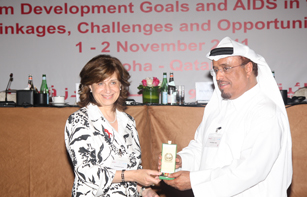
UNAIDS Regional Director for MENA Hind Khatib accepting an award from Lt. General Dahi Khalfan Tamim, Commander in Chief, Dubai Police on behalf of UNAIDS Executive Director Michel Sidibé.
Participants agreed that families can be highly protective as they offer a dependable means of HIV prevention education and the clout to keep children in school, on track and out of risk. Family support can improve adherence to HIV treatment, provide sustaining care and offer the first line of protection against stigma and isolation.
“Countries in MENA need to help families mobilize against AIDS through education, outreach and helping to rise up against the stigma associated with AIDS,” said Dr Faleh Mohammed Hussain Ali, Assistant Secretary General for Policy Affairs at the Supreme Council of Health in Qatar.
In addition to placing the family at the heart of the AIDS response, participants also called for enhanced political commitment and better engagement of civil society including the media.
UNAIDS Regional Director for MENA Hind Khatib stressed that achieving UNAIDS vision of zero discrimination, zero new HIV infections, and zero AIDS related deaths will require more than simply accepting the validity of current political, social and scientific approaches. “It will require a deliberate creative act of promoting family ties and cultural values, confronting social norms and re-examining laws that detract people of their dignity and respect.”
External links

Feature Story
Grassroot Soccer appoints UNAIDS Executive Director as a member of its Global Board of Directors
03 November 2011
03 November 2011 03 November 2011
UNAIDS Executive Director Michel Sidibé poses for a team photo with young people taking part in one of the Grassroots Soccer skills building sessions. Capetown, 4 May 2011.
Credit: UNAIDS/AFP Photo G. Guercia
Grassroot Soccer announced on Wednesday the appointment of the UNAIDS Executive Director Michel Sidibé as a member of its Global Board of Directors. Grassroot Soccer is an international nonprofit organization that uses the power of soccer to prevent new HIV infections among youth in Africa.
“Learning through sport is one of the most effective ways of building confidence and raising HIV awareness,” said Mr. Sidibé. “Grassroot Soccer is making a positive difference in the lives of young people across Africa and I am very proud to be a part of this important movement.”
The non-profit organization also appointed the former CEO of Product (RED) Susan Smith Ellis as a member of its Board.
“In our first ten years, we’ve provided more than 450,000 young people in Africa with vital information on HIV prevention and life skills,” said Thomas Clark, MD, Grassroot Soccer Founder and CEO. “With the expertise and passion of these new board members to compliment our team, we’re confident we will reach our goal of graduating one million youth through our program by the World Cup 2014, and empowering whole communities to live more healthy productive lives, with soccer as the hook.”
Learning through sport is one of the most effective ways of building confidence and raising HIV awareness
UNAIDS Executive Director Michel Sidibé
Grassroot Soccer has programs in 10 African countries with flagship sites in South Africa, Zambia, and Zimbabwe. Founded in 2002 by four professional soccer players, Grassroot Soccer engages professional African football players, coaches, teachers and peer educators in several countries to deliver an interactive HIV prevention and life skills curriculum to youth. Topics include making healthy decisions, avoiding risk, building support networks, reducing stigma and discrimination, increasing knowledge about testing and treatment, addressing gender issues and assessing values.
External links
External links
Related

Feature Story
2011 Human Development Report: Health and development gains threatened by lack of equity and sustainability
02 November 2011
02 November 2011 02 November 2011
Understanding the links between sustainability and equality is critical, says the 2011 Human Development Report
Progress in health and development in the poorest countries is in serious danger if the world does not make a concerted effort to reduce inequities, protect the environment and promote sustainability. This is the stark warning highlighted in the 2011 Human Development Report, launched on Wednesday by the United Nations Development Programme (UNDP).
Sustainability and Equity: A Better Future for All, explores in great detail the relationship between health, education, income, gender disparities, sustainability and social inequalities. Significant progress cannot be achieved in one area without progress in all. If such gains are not attained, the least developed countries could see themselves diverging significantly from global patterns of development by 2050. The ideas expressed in the document are very much intended to provide a key focus of debate in the run up to the 2012 UN Conference on Sustainable Development (Rio+20).
As the UNDP Administrator Helen Clark states in the report’s foreword, understanding the links between sustainability and equality is critical, “if we are to expand human freedoms for current and future generations.” She adds, “The remarkable progress in human development over recent decades cannot continue without bold global steps to reduce both environmental risks and inequality.”
According to the Human Development Report, sustainability does not touch only on the environment but on the very way we choose to live our lives, with full awareness that our actions will have potentially profound consequences for coming generations.
A Better Future for All notes that although the majority of people across the globe are becoming healthier and living longer, sub-Saharan Africa has not seen the same decline in health inequality. This is especially the case in southern Africa which is still bearing the brunt of the HIV epidemic with adult prevalence exceeding 15 percent in several countries. The report highlights the need to address the social, educational and gender inequities to successfully respond to the AIDS epidemic.
The remarkable progress in human development over recent decades cannot continue without bold global steps to reduce both environmental risks and inequality.
Helen Clark, UNDP Administrator
Gender disparity, evidenced by a lack of access to reproductive health products and services for many of the world’s women, is also shown in the report to have a profound effect on health, environmental sustainability and poverty.
An expansion in reproductive health rights, health care and contraceptive access will not only benefit individual women and their families but could have a marked effect on slowing global population growth. According to the report, some 215 million women in developing countries have unmet family planning needs. However, in every country where such needs are met and women have comprehensive reproductive options, fertility rates are at, or below, replacement level.
The report concludes that it is possible to implement programmes which have an impact on sustainability and equity, with benefits for both people who are most disadvantaged and for the environment itself. Such programmes have sustainability and equality etched into policy and programme design and reserve a critical space for the voices of the most deeply affected.
UNDP has commissioned the editorially-independent Human Development Reports each year since 1990, when its Human Development Index (HDI), a composite measure of health, education and income, first challenged purely economic measures of national achievement and called for consistent global tracking of progress in overall living standards.
External links
External links
Publications

Feature Story
Kenya's Prime Minister commits to the goal of eliminating new HIV infections in children by 2015
02 November 2011
02 November 2011 02 November 2011
Kenyan Prime Minister Raila Odinga (left) shakes hands with UNAIDS Executive Director Michel Sidibé following a meeting at the Prime Minister’s office in Nairobi on 2 November.
In a meeting with Kenyan Prime Minister Raila Odinga on 2 November, UNAIDS Executive Director commended the Government of Kenya on progress in the country’s HIV response, including the significant scale-up in treatment access and expansion of services to prevent new HIV infections among children.
Over the past decade, Kenya has stabilized its rate of new HIV infections. National adult coverage of antiretroviral therapy has expanded from an estimated 4% in 2004 to 72% in 2010. About 78% of pregnant women living with HIV are now receiving antiretroviral treatment to prevent new HIV infections in their children, compared to 21% in 2006.
“Building on the momentum of this year’s High Level Meeting on AIDS, we are seeing unprecedented support for our vision of zero new HIV infections among children and keeping their mothers alive,” said Mr Sidibé, while meeting with the Prime Minister in Nairobi. “I congratulate the Government of Kenya for translating this goal into action on the ground.”
Prime Minister Odinga said that the Government of Kenya will pursue the initiation of a national declaration calling for the elimination of new HIV infections among children by the year 2015. “I will lead all line ministries to support this critical goal,” he said.
This is a great opportunity for us to lead on HIV and human rights for the people of Kenya who need access to services and justice
Kenyan Prime Minister Raila Odinga
The Prime Minister underscored that Kenya’s new constitution, adopted in August 2010, is a model for equity and social inclusion. “This is a great opportunity for us to lead on HIV and human rights for the people of Kenya who need access to services and justice,” he said. Greater financial contributions from national sources will be critical to ensure the long-term sustainability of Kenya’s response to AIDS, he added.
The UNAIDS Executive Director commended the Government of Kenya for establishing the Kenya HIV/AIDS Tribunal under the Kenya HIV Prevention and Control Act—one of the first tribunals in the world aimed at increasing access to justice for people affected by HIV and addressing HIV-related stigma and discrimination.
Mr Sidibé’s meeting with Prime Minister Odinga launched his two-day official UNAIDS mission to Kenya. During the mission, the UNAIDS Executive Director will meet Kenya’s Minister of Special Programmes, the Minister of Public Health and Sanitation and the Minister for Medical Services. He will also deliver opening remarks at a consultation for Global Fund Implementers.
Related

Feature Story
Getting to Zero selected as World AIDS Day theme
01 November 2011
01 November 2011 01 November 2011
“Getting to Zero” is the theme selected by the World AIDS Campaign (WAC) to commemorate this year’s World AIDS Day on 1st December. The new theme, that will be used until 2015, echoes the UNAIDS vision of achieving “Zero new HIV infections. Zero discrimination. Zero AIDS-related deaths.”
The decision to choose "Getting to Zero" as the theme came after extensive consultations among people living with HIV, health activists and civil society organizations.
"The potential for creative, connected and meaningful campaigning is really exciting,” said World AIDS Campaign Africa Director, Linda Mafu. "Our organization will focus on Zero AIDS Related Deaths, but the choice is there for others to pick a different zero or all three. It's time to use our imaginations and let everyone know that Getting to Zero is a must,” she added.
It's time to use our imaginations and let everyone know that Getting to Zero is a must
World AIDS Campaign Africa Director, Linda Mafu
Giving regions, countries and constituencies the latitude to focus on one or all of the Zeros that is most relevant to their context was central to the WAC’s decision, an approach fully supported by UNAIDS. “Getting to Zero is the overall agenda for responding to HIV in the next five years, but the priority may be zero discrimination in some parts of the world and zero AIDS related deaths in some other parts—it’s important to keep this connection with the local realities” said Djibril Diallo, Director of Global Outreach at UNAIDS.
This year’s World AIDS Day is anticipated to see renewed activism from the civil society as 1st December 2011 falls only 6 months before the International AIDS Conference taking place in Washington DC. This year also marks the 30th year since AIDS was first report. World AIDS Day will be a platform to pay tribute to early advocates of the response.
Observed worldwide on 1 December since 1998, World AIDS Day is the moment of the year where millions of people come together across the globe to commemorate people who lost their lives to HIV, applaud progress made in responding to the epidemic and recommit to ending the epidemic.

Feature Story
Women living with HIV championing the response to AIDS in Kenya
31 October 2011
31 October 2011 31 October 2011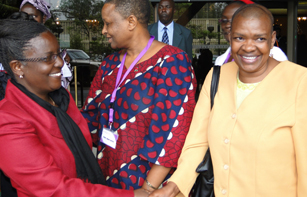
Minister for Special Programmes Esther Murugi (left) greeting Ms. Asunta Wagura, representative of women living with HIV and advocate for the elimination of vertical transmission of HIV.
More than 200 women living with HIV in Kenya committed to championing the response to AIDS in the country. The call for more involved action came at the end of a two-day National Leadership Conference for Women Living with HIV.
The purpose of the meeting was to reenergize women living with HIV towards strengthening their leadership roles in the HIV response. The conference was facilitated by the National AIDS Control Council and the Network of People Living with HIV in Kenya with support from the UN Joint Team on AIDS.
In her opening remarks, Minister for Special Programmes Esther Murugi reiterated “the urgent need to develop strong leadership of women living with HIV to take the reins to end the AIDS epidemic”.
With its theme of “Championing Women Leadership to AIDS”, the forum centred around three key thrusts: women’s leadership to create a social movement and community action for HIV prevention; women’s political leadership to develop opportunities offered by the new constitution; and women’s leadership to improve uptake and delivery of HIV services.
Kenyan government statistics indicate that national HIV prevalence is 6.3 %, compared to 8 % for women. HIV prevalence among women is nearly double the rate for men, which is 4.3 percent. HIV prevalence among young women aged 15 – 24 years is more than four times higher than men in the same age group at 4.5 and 1.1 percent, respectively.
Women and girls living with HIV must be meaningfully engaged at every stage of national HIV responses to ensure that their needs are well addressed
UNAIDS Country Coordinator, Maya Harper
Women have been pioneers in the AIDS response, as care providers but also as community leaders. The conference provided a forum for women to re-position the leadership of women living with HIV by building on the achievements of the earlier women movements. It also provided a platform to discuss advocacy efforts to influence policies, planning and budgeting processes in national AIDS programmes to respond to the needs of women and girls living with HIV.
“Women and girls living with HIV must be meaningfully engaged at every stage of national HIV responses to ensure that their needs are well addressed,” said UNAIDS Country Coordinator, Maya Harper.
Participants agreed to strengthen strategies to include women living with HIV in national AIDS response as well as to explore opportunities to mentor, empower and build capacity of young women and mentor young women living with HIV into leadership. Participants also resolved to develop advocacy groups at national level to drive the agenda for women living with HIV and increase domestic funding for HIV response.
One highlight of the event was an award ceremony to honour women living with HIV who have championed for and contributed towards Kenya’s HIV response. The awardees were drawn from all regions of the country and included people living with disabilities.
The Minister of Gender, Children and Social Development, Dr Naomi Shabaan, urged the awardees to “continue to mentor others and together we will end AIDS”.


